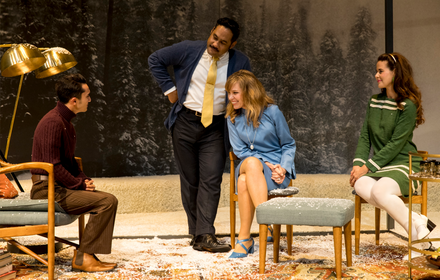Professor Sir Jonathan Bate CBE is the author of several award-winning works on Shakespeare, including his theatrical memoir, Mad About Shakespeare. Sydney writer Andy McLean asked Jonathan to take us on a guided tour of Twelfth Night.
Andy McLean: In the final (and very moving) chapter of Mad About Shakespeare, you say Twelfth Night “invites us to share the experience of going through the looking glass, to the other side of the world where all expectations are upended”. Can you explain this for us?
Jonathan Bate: That’s a metaphor that came from the first production of Twelfth Night that I ever saw, which was a touring Royal Shakespeare Company production, way back in the 1970s, when I was a teenager. It was a small-scale touring production but with a great cast, including Sir Ian McKellen.
The production began with a stage effect in which you thought you were looking at a giant mirror at the back of the stage. But then Viola stepped through the mirror and into Illyria. And this seemed to me a very good visualisation of the sense that, when we arrive in Illyria, we are going into this strange kind of alternative world – a world, as perhaps the name Illyria suggests, of illusion.
You had a teacher at the University of Cambridge, the poet Dr Glen Cavaliero, who taught you that “every great literary work is a voyage to Illyria”. Tell us a little about this idea.
It’s this idea around asking that basic question: What is literary creation for? What is a play, a novel, a poem for? It’s to open up a world you haven’t seen before and, in so doing, to make you see you own world in a new way.
And that seems to be exactly what the voyage to Illyria in Twelfth Night is.
For me, it’s a play I’ve always loved but, somehow, as I’ve got older, it’s become more and more at the centre of my thinking about Shakespeare and about the power of literature in general. Just this idea that we should open ourselves to a strange new world – O brave new world, as Miranda says in The Tempest.
In Mad About Shakespeare, you warn against biographical interpretations of Shakespeare’s works. Although you also say: “…I am convinced that Twelfth Night was shadowed by the death of Shakespeare’s only son, young Hamnet… I think of the play as a gift for [Hamnet’s twin sister] Judith.” This is a beautiful thought.
We have to be very cautious about ascribing autobiographical origins to Shakespeare’s plays because the great thing about Shakespeare is his ability to imagine all kinds of lives so different from his own… But it must be the case that, at some level, all writers have to draw on their own experience.
And if you have a writer who has boy/girl twins, and then that boy [Shakespeare’s son, Hamnet] dies. And then you write a play in which the girl twin thinks her brother has died [but eventually he is returned to her]. And that play is performed on the very anniversary of the christening of Shakespeare’s twins; then, you think, there’s got to be an autobiographical element in there.
The thing that’s so striking about the play is that, of all Shakespeare’s comedies, Twelfth Night is the one that has the greatest feeling of loss within it. That’s a paradox, because comedies should be all about marriage and happy endings. But there’s a tremendous sense of sadness that runs through it, and a sense that Viola is trying to find words to express her feelings about the loss of her brother.
Then, of course, she finds her brother and there’s that fantastic scene where they come together, and it’s one of the most moving moments in all of Shakespeare.
Bell Shakespeare’s new production of Twelfth Night has toured Australia, and arrives in Sydney from 24 October – 19 November.
Header image credit, Adelaide Festival.





